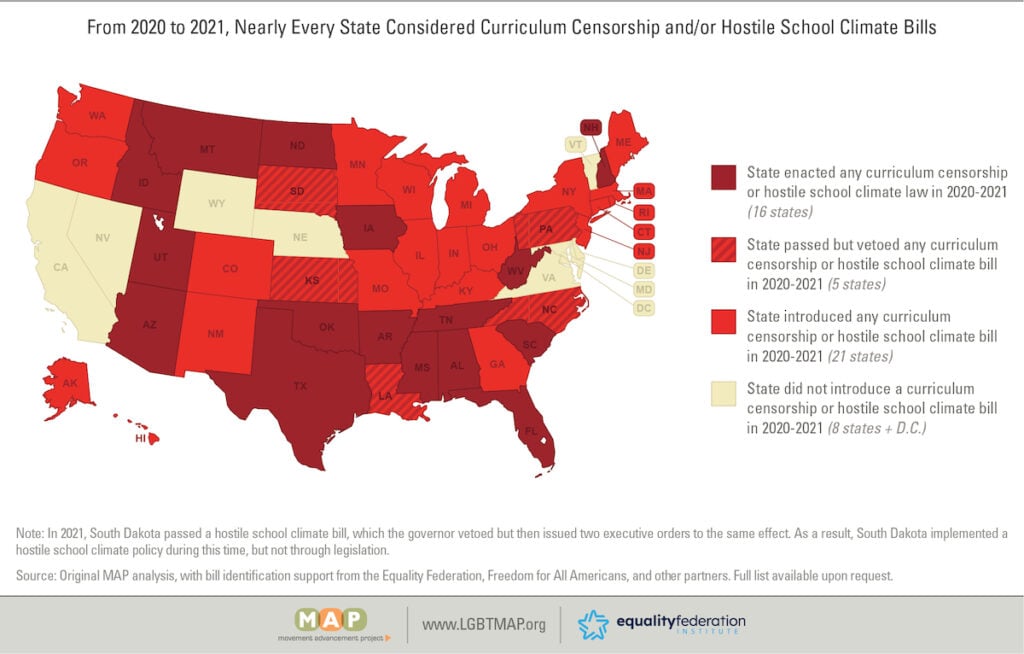
If it seems like politicians want to make school life tougher for LGBTQ+ students and others from marginalized populations, you’re not wrong — the numbers bear it out. Photo: Movement Advancement Project.
If it seems like politicians want to make school life tougher for LGBTQ+ students with bills like “Don’t Say Gay” and additional students from marginalized populations, you’re not wrong — the numbers bear it out.
So far this year, 280 bills have been introduced in states around the nation that would censor lessons on LGBTQ+ and racial issues or create a hostile school climate for vulnerable students, according to a new report from the Movement Advancement Project, in partnership with the Equality Federation.
That’s more than 2020 and 2021 combined, the report says.
At least 40 bills have been introduced in 19 states that would ban or limit mention of LGBTQ+ people and issues, a category known informally as “Don’t Say Gay” legislation, like the bill awaiting Gov. Ron DeSantis’ signature in Florida.
Bills that would censor school discussions of race have been put forth in 33 states.
Cathedral City LGBT Days is California’s first Pride event of 2022
“These bills vary widely from state to state,” notes a summary of the report. “Some of these bills would give politicians veto power over school curricula that discuss the contributions of Black Americans to U.S. history, the Holocaust, or allow parents to sue schools if LGBTQ issues are discussed.”
Some also seek to ban certain books as well.
The hostile climate bills cover several areas:
- Barring transgender students from playing on the sports teams designated for their gender identity
- Requiring faculty and staff to out LGBTQ+ students to their parents
- Limiting use of a student’s preferred name and pronouns
- Rolling back nondiscrimination protections.
At least 40 states considered such legislation in the past two years, and measures like this continue to be introduced in 2022.
Also, 11 states have enacted trans-exclusionary sports laws from 2020 to 2022.
“Unfortunately, it’s no surprise that these legislative attacks on school curricula and school climate are happening right now,” the report states. “These bills reflect a coordinated effort on behalf of well-financed, far-right lobbyists seeking to undermine the progress made in recent years toward addressing racism and advancing LGBTQ equality. This coordination is evident in the copy-cat language seen in bills across many states, and further in publicly released campaign strategies from the lobbyists behind these bills.
“What’s more, this coordinated campaign is attempting to take advantage of the fears and anxieties many parents are facing right now amid the ongoing COVID-19 pandemic and the loss of control or security around their children’s health, including at school. This strategy of undermining progress in the disguise of ‘protecting American history’ or ‘parental rights’ is now a leading strategy being used to divide Americans in service of a far-right agenda. Especially in advance of the 2022 midterms, and with the 2024 presidential race just around the corner, these bills turn schools into a political battlefield and put partisan interests ahead of the best interests of children.”
Violence Against Women Act expands services to LGBTQ+ survivors
“The politicians and groups behind these bills want to use our laws to control what students can and cannot read, what they can and cannot learn, and — most troublingly — who they can and cannot be,” Ineke Mushovic, executive director of MAP, said in a press release.
“Our schools should protect all students — including LGBTQ students and students of color — so they can learn and thrive in a safe environment. America is a country of freedom of speech and freedom of ideas,” Mushovic said. “Those freedoms end when politicians start banning books and censoring curriculum simply because some people find them uncomfortable.”
Mushovic added: “All our kids deserve an education that is honest, accurate, and gives them the tools to learn from our past so they can help create a better future.”
This article originally appeared on Advocate.com, and is shared here as part of an LGBTQ+ community exchange between Q Voice News and Pride Media.
